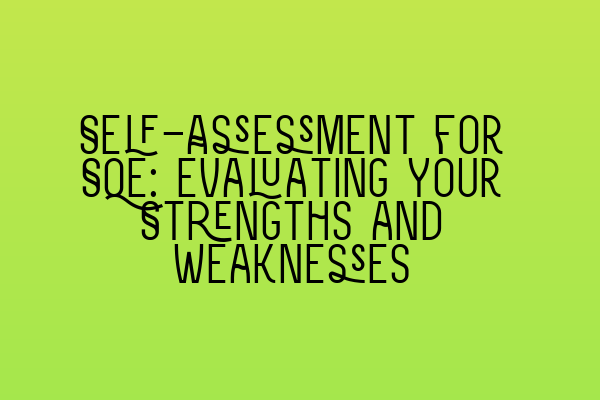Self-Assessment for SQE: Evaluating Your Strengths and Weaknesses
Preparing for the Solicitors Qualifying Examination (SQE) requires a comprehensive understanding of your strengths and weaknesses. Self-assessment plays a crucial role in this process, allowing you to identify areas where you excel and areas that require improvement. By evaluating yourself honestly and objectively, you can develop a targeted study plan that maximizes your chances of success. In this article, we will explore the importance of self-assessment for SQE preparation and provide you with valuable insights to help you evaluate your own abilities.
1. Understanding the SQE Exam
Before diving into self-assessment, it is essential to familiarize yourself with the structure and content of the SQE exam. The SQE consists of two stages: SQE1 and SQE2. SQE1 is a multiple-choice examination that tests your application of legal knowledge and skills. On the other hand, SQE2 is a series of practical assessments that evaluate your legal skills in a simulated work environment. Having a clear understanding of these exam components will help you identify the specific areas you need to assess.
2. Identifying Your Strengths
Start by reflecting on your existing legal knowledge and skills. Consider any previous legal education or work experience you may have. Identify the areas where you feel confident and competent. This could include subjects you have studied in depth or practical skills you have honed through real-world experience. These strengths will serve as a solid foundation for your SQE preparation.
While assessing your strengths, make a list and prioritize them based on their relevance to the SQE syllabus. By understanding your strengths, you can allocate your time and resources effectively, focusing on areas that need more attention. Utilize practice questions, online resources, and mock exams to reinforce your existing strengths.
Related Article: SQE Mock Debrief Sessions: Analyzing Your Performance for Growth
3. Recognizing Your Weaknesses
Identifying your weaknesses is just as vital as recognizing your strengths. Be honest with yourself and pinpoint the areas where you struggle or lack confidence. It could be intricate legal concepts, complex practical scenarios, or specific subject areas that you find challenging. Remember, acknowledging your weaknesses is not a sign of failure but an opportunity for growth.
Once you have identified your weaknesses, allocate additional time and resources to improve them. Seek out study materials, attend revision courses, or consult with legal professionals for guidance. Practicing past examination questions and participating in mock debrief sessions can be enormously beneficial in addressing your weaknesses and enhancing your overall performance.
Related Article: Unveiling the Solicitors Qualifying Examination (SQE): What You Need to Know
4. Setting SMART Goals
After identifying your strengths and weaknesses, it’s time to set SMART goals. SMART goals are specific, measurable, achievable, relevant, and time-bound. They help you stay focused, motivated, and accountable throughout your SQE preparation journey.
Break down your overall goal of passing the SQE into smaller, achievable targets. For example, aim to complete a certain number of practice questions each week or spend a fixed number of hours studying specific subjects. By setting SMART goals, you can measure your progress effectively and adjust your study plan accordingly.
Related Article: Tips for SQE Success: Key Pointers for a Stellar Performance
5. Seeking Professional Guidance
While self-assessment is crucial, seeking professional guidance can provide valuable insights and support your SQE preparation. Engage with qualified solicitors, tutors, or mentors who can provide expert advice and personalized feedback. Their expertise can help you identify blind spots, refine your study plan, and enhance your overall performance.
Related Articles: Comprehensive SQE Prep Resources: Your Key to Exam Readiness
6. Regularly Evaluating Your Progress
Evaluation should not be a one-time activity; it should be an ongoing process. Regularly assess your progress by tracking your performance in practice tests and mock exams. Analyze your strengths and weaknesses based on the results, and adjust your study plan accordingly. By identifying areas where you have made significant improvements and areas that still require attention, you can fine-tune your preparation strategy for ultimate success.
Related Article: SQE Mocks Unleashed: Maximizing Your Preparation with Realistic Practice
Final Thoughts
Self-assessment is an invaluable tool for SQE preparation. By identifying your strengths and weaknesses, setting SMART goals, seeking professional guidance, and regularly evaluating your progress, you can develop a targeted study plan that optimizes your chances of success in the SQE exam.
Remember, self-assessment is a continuous process. Embrace the opportunity to grow, adapt, and improve throughout your SQE journey. Good luck!

Leave a Reply